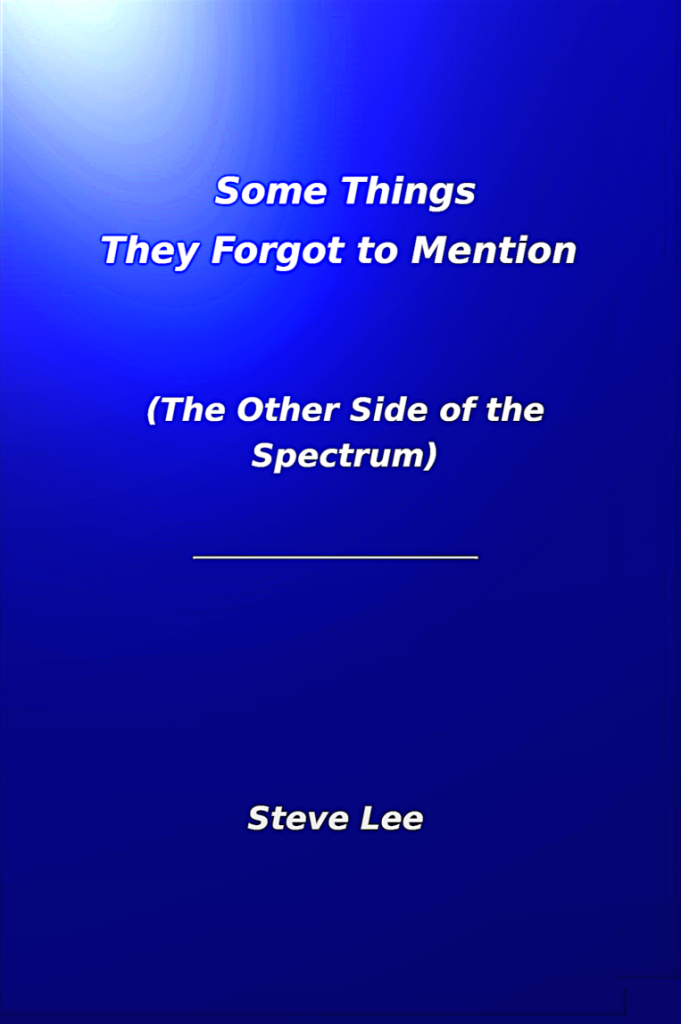(c) 2022
Somehow, somewhere along the line, most of us seem to have fallen victim to the notion that science and technology have all-but figured everything out. What with the advent of the smart phone, the smart watch, smart dog bowl, and now the smart refrigerator, what else is there? Compared to a refrigerator that texts me in the middle of my meetings with the Queen to announce to the world we are almost out of bratwurst, walking on the moon seems almost trite.
In the midst of this panacea of smartness however, “Some Things They Forgot to Mention” offers a cold hard dose of reality, demonstrating for us the fact that not all smart things are as they seem. As it turns out, much of what we think we know about “science” and the world around us is, at the very least, incomplete. Examples underscoring this fact include many of the key details about how the universe operates, not the least of which are some of the most fundamental forces that govern nature and thereby directly affect life itself.
Using a range of select curiosities in math, science, biochemistry, and current events, “Some Things They Forgot to Mention” takes us on a journey of discovery, even as it addresses some of these assumptions head-on. As this discussion works its way across our “spectrum of acquired knowledge”, we eventually land hard at the “darker” end of this spectrum where we find the less logical and baser aspects of human nature festering in the realm of “Political Science”. In this sea of gross dysfunction and corruption we see the seeds of our undoing – an end largely fueled by our own hubris and ignorance. This, even as the animal side of our nature now threatens to undo much of what our ancestors struggled to achieve over the past 1000 years – many paying the ultimate price for those gains with the blood of their own sons and daughters.
Drawing from both ancient history and current events, “Some Things They Forgot to Mention” offers us some serious food for thought about what all of this is telling us. Foremost of these things, is the glint of an understanding that causality implies there are certain consequences for the choices we make. As we begin our downward slope of the whole “Rise and Fall” pattern in history, we are now beginning to see the effects of these consequences, and the hint of the certain immutable long-term repercussions they bring that could easily cripple civilization for the next 1000 years – if not destroy it altogether.
Contributor notes:
“Some Things They Forgot to Mention” cuts a fairly wide swath across a number of academic disciplines, drawing elements from history (ancient and modern), math, science, biochemistry, and engineering. The premise underlying this effort was that there are many average people “out there” who are both curious about how everything works, as well as concerned about where all of this is taking us.
Thus, the goal of this book was two-fold. First, to offer the reader some insights into a number of key aspects of science and the fundamental forces in nature that make life possible, as well as a look at those forces that run much of our modern world (both for good and evil). The second objective was to demonstrate that much of what we think we know about it all, and thus our sense of being the masters of our collective destinies, is clearly not what we’ve allowed ourselves to believe.





Key Words:
Rise and Fall of civilization, 2008 global financial implosion, science and progress, physics, quantum mechanics, chaos, nuclear engineering, electromagnetics, the Fall of Rome, US Civil War, WWII, Cold War, Abraham Lincoln, Moses, Jesus, Vasili Arkhipov, 2020 riots, Joe Biden, crime, dysfunction, political corruption, US Federal debt, $30 trillion debt bubble collapse.
